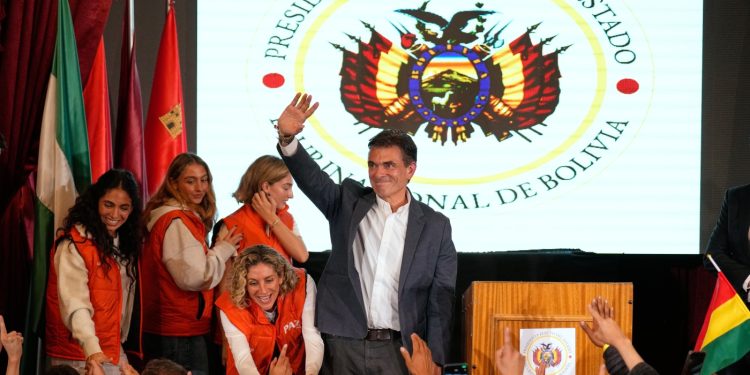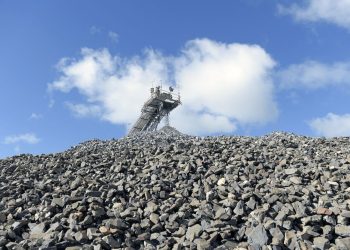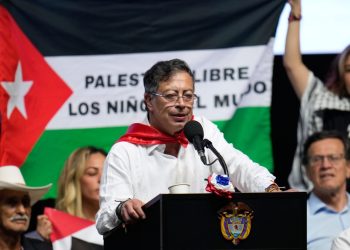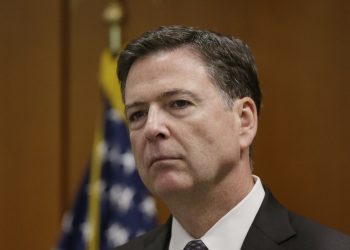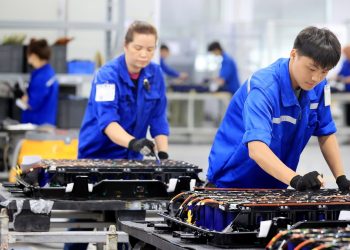Presidential candidate Rodrigo Paz greets his supporters after preliminary results showed him leading the presidential election runoff in La Paz, Bolivia, on Sunday.
Natacha Pisarenko/AP
hide caption
toggle caption
Natacha Pisarenko/AP
LA PAZ, Bolivia — Rodrigo Paz, a centrist senator who has never been a major national figure until now, won Bolivia’s presidential election Sunday, preliminary results showed, galvanizing voters outraged by the country’s economic crisis and frustrated after 20 years of rule by the Movement Towards Socialism party.
“The trend is irreversible,” Óscar Hassenteufel, president of the Supreme Electoral Tribunal, said of Paz’s lead over his rival, former right-wing president Jorge “Tuto” Quiroga.
Paz won 54% of the vote, according to initial results, compared to 45% for Quiroga.
Paz took the podium Sunday evening, flanked by his wife, María Helena Urquidi, and his four adult children. The ballroom of a hotel in La Paz, the Bolivian capital, went wild, with people shouting his name and holding their phones in the air.
“Today Bolivia can be sure that it will be a government that will provide solutions,” he told his supporters. “Bolivia breathes a wind of change and renewal to move forward.”
Shortly after the results were announced, Quiroga conceded to Paz.
“I called Rodrigo Paz and wished him congratulations,” he said in a somber speech, drawing boos and cries of fraud from the audience. But Quiroga called for calm, saying a refusal to recognize the results would “leave the country in suspense.”
“We would only make matters worse for people suffering from the crisis,” he said. “We need a mature attitude right now.”
Paz and his popular vice presidential candidate, former police captain Edman Lara, have gained ground among working-class and rural voters, disillusioned with the spending spree of the ruling Movement Toward Socialism, or MAS, party but wary of Quiroga’s radical 180-degree turn away from his social protections.

Presidential candidate Jorge “Tuto” Quiroga hugs his running mate Juan Pablo Velasco, right, after early results showed him in a runoff presidential election Sunday in La Paz, Bolivia.
Juan Karita/AP
hide caption
toggle caption
Juan Karita/AP
Quiroga’s embrace of the International Monetary Fund – an organization that has long sparked political resentment in Bolivia – for a shock treatment program of the type that Bolivians experienced and feared in the 1990s also alienated more moderate voters.
Paz’s victory puts this South American nation of 12 million on a very uncertain path as it seeks to make major change for the first time since the 2005 election of Evo Morales, founder of MAS and Bolivia’s first indigenous president.
Even though Paz’s Christian Democratic Party has a slight majority in Congress, it will still have to make compromises to push through an ambitious overhaul.
Paz plans to end Bolivia’s fixed exchange rate, phase out generous fuel subsidies and cut large public investments, reshaping much of the MAS economic model that dominated for two decades. But he says he will maintain MAS-style benefits and take a gradual approach to free-market reforms, hoping to avoid a sharp recession or a surge in inflation that would anger the masses – as has already happened in Bolivia.
Morales’ efforts to remove fuel subsidies in 2011 lasted less than a week as protests ravaged the country.
Paz inherits a crumbling economy
Paz’s supporters erupted into loud cheers and ran through the streets of La Paz, setting off fireworks and honking car horns. Crowds gathered at a downtown hotel where Paz spoke, some shouting: “The united people will never be defeated!” »
“We feel victorious,” Roger Carrillo, a volunteer for Paz’s party, said by telephone from eastern Bolivia, where he was assembling a celebratory caravan. “We know there’s work ahead of us, but we just want to enjoy this moment.”
Behind the celebrations, Bolivia faces an uphill battle.
Since 2023, the Andean nation has been crippled by a shortage of U.S. dollars that is depriving Bolivians of their own savings and hampering imports. Year-on-year inflation soared to 23% last month, the highest rate since 1991. Fuel shortages are crippling the country, with motorists often queuing for days to fill up.
To survive even his first months, Paz must replenish the country’s meager foreign currency reserves and restart fuel imports.
Promising to avoid the IMF, Paz pledged to raise needed liquidity by fighting corruption, cutting wasteful spending and restoring enough confidence in the country’s currency to draw U.S. dollar savings under Bolivians’ mattresses and into the banking system.
But Paz’s stated reluctance to impose fiscal curbs – with promises of financial aid to the poor to cushion the blow of subsidy cuts – has drawn criticism.
“It’s so vague, I feel like he’s saying these things to please voters when financially it doesn’t hold water,” said Rodrigo Tribeño, 48, who voted for Quiroga on Sunday. “We needed real change.”
A foreigner with political experience
Although Paz, the son of former President Jaime Paz Zamora, who was in power from 1989 to 1993, spent more than two decades in politics as a lawmaker and mayor, he emerged in this race as a political unknown. The senator unexpectedly rose from the bottom of the polls to first place in the August vote.
His party won six of the country’s nine regional departments, including Bolivia’s western Andean highlands and the large coca-producing region of Cochabamba, winning over significant swathes of indigenous Aymaras and the Bolivian working class who once formed Morales’ base.

Supporters of presidential candidate Rodrigo Paz celebrate after preliminary results showed him leading Sunday’s runoff presidential election in La Paz, Bolivia.
Ivan Valencia/AP
hide caption
toggle caption
Ivan Valencia/AP
Paz’s slogan, “capitalism for all,” appealed to many merchants and entrepreneurs who prospered during Morales’s era but later chafed at his high taxes and regulations.
Quiroga, on the other hand, was home to the richest lowlands of eastern Santa Cruz, known as the agricultural powerhouse of the country.
“There is a very clear class difference. For Quiroga, you have people who have been part of the political and economic elite for a long time – businessmen, agro-industrialists,” said Verónica Rocha, a Bolivian political analyst. “With Paz, it’s the opposite.”
An ex-cop shakes up the race
The race appeared to be a quiet affair until Paz surprised everyone by choosing Lara as his running mate. The charismatic young ex-police officer had no political experience but rose to prominence on TikTok after being fired from the police force for exposing corruption in viral videos.
Out of work, he sold second-hand clothes to support himself and worked as a lawyer to help Bolivians expose corruption – a story that resonated with many former MAS supporters.
Lara’s fiery, populist promises of a universal income for women and higher pensions for retirees often forced Paz into damage control, causing tensions on the campaign trail. But for those who see Lara as a controversial and brash woman, many Bolivians say these traits evoke authenticity compared to other telegenic and scripted contestants.
Lara struck an unusually conciliatory tone in her remarks after her victory on Sunday.
“It’s time to unite, it’s time to reconcile,” Lara told her supporters after learning of her victory, adopting a more conciliatory tone than usual. “Political divisions are over.”
Many Bolivians interviewed Sunday said they voted for Lara as if he were at the top of the list.
“Lara is the one who behaves more like a president than like Paz. Many of us think Lara will end up leading the country,” said Wendy Cornejo, 28, a former Morales supporter who sells crackers in downtown La Paz.


